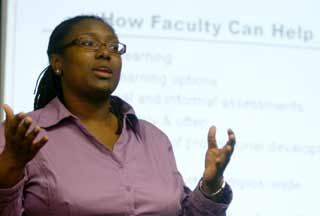Identifying struggling students
It only takes one professor to make the difference.
Eastern faculty learned how to beat ineffective learning and help struggling students Monday at a workshop focused on the student perspective of learning.
The Student Success Center conducted the workshop “Characteristics of At-Risk Students” to aid faculty in identifying and referring struggling students to the center for assistance.
Poor study habits, depression and uneasy transitions into college are all factors that might disrupt a student’s success in the classroom.
“Some students have complications with individual classes and others have bigger issues pertaining to all their classes,” said Cindy Boyer, program coordinator for the Student Success Center.
Students might have a multitude of problems that other professors have not identified signs of, but by referring a student for help, one professor can make a difference, Boyer said.
Aside from identifying at-risk students, Boyer also showed attending faculty members how to anonymously submit a student’s name to the Student Success Center’s Web site for further assistance.
Fern Kory, professor of English and assistant director of the Writing Center, was one of the 11 attendees participating in the workshop and she said most students will need help at some point if not consistently during college.
“You’re always being pushed beyond what you know and what you have mastered because that’s how you learn,” Kory said. “And you wouldn’t be in college if you knew everything. It’s only natural for someone to need help when being pushed beyond their limits.”
During the workshop, Kory said she often sees students in the Writing Center who become upset after being referred for writing complications they do not think they have.
“These students know they’re struggling and yes, there are some non-responsive students,” Boyer said. “But most students who show up want to change and are simply glad that someone cares.”
To what extent and how often faculty should make anonymous referrals was also addressed.
“Do they want us to refer anyone who does bad on exams or students who seem like they have larger academic problems?” said attendee Don Holly, assistant professor of anthropology.
Boyer told the group to refer any student who shows signs of academic struggle. She said some students might not believe they need help, but might reconsider after their first visit. That’s why it is important to make the referral anyway, she said.
The Student Success Center is housed in the Pemberton Hall Dining Room during its transition to a new office.
A $1.8 million Title III Insitutional Development Grant funds the center and the construction of its new office.
Identifying struggling students

Taisha Mikell, a student success specialist at the Student Success Center, speaks about how teachers can help a struggling student during the faculty workshop in the Effingham Room of the Martin Luther King Jr. Union on Monday morning.





































































